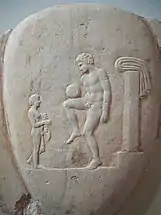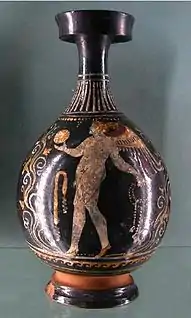Episkyros
Episkyros (Ancient Greek: Ἐπίσκυρος, Epískyros; also Ἐπίκοινος, Epíkoinos, 'commonball')[2][3] was an ancient Greek ball game. Highly teamwork oriented,[4] the game was played between two teams of usually 12 to 14 players each, with one ball and the rules of the game which allowed using hands.


Although it was a ball game, it was violent, at least in Sparta.[5] The teams would try to throw the ball over the heads of the other team. There was a white line called the skuros[4] between the teams and another white line behind each team. Teams would change the ball often until one of the team was forced behind the line at their end. In Sparta a form of episkyros was played during an annual city festival that included five teams of 14 players.[6][7][8][9][10] It was played primarily by men but women also practiced it. The Greek game of episkyros, or a similar game called phaininda (φαινίνδα)[11][note 1] was later adopted by the Romans, who renamed and transformed it into harpastum.[13][14] The name harpastum is the latinisation of the Greek harpaston (ἁρπαστόν), neuter form harpastos (ἁρπαστός), meaning 'carried away'[15] from the verb harpazo (ἁρπάζω), '(I) seize, snatch'.[16]
A depiction in low relief on the belly of the vase displayed at the National Archaeological Museum, Athens[1] shows a Greek athlete balancing a ball on his thigh. This image is reproduced on the European Cup football trophy.[17] Other ancient Greek sports with a ball besides phaininda, were: ἀπόῤῥαξις (aporrhaxis, 'bouncing ball game'),[18] οὐρανία (ourania, 'throwing a ball high in air game')[19][20] and maybe the σφαιρομαχία (sphairomachia, lit. 'ball-battle')[21] from σφαῖρα (sphaira 'ball, sphere')[22] and μάχη (machē, 'battle')[23] although it has been argued that the σφαιρομαχία is in fact a boxing competition (the "spheres" being in fact a kind of gloves).[24]
Julius Pollux includes phaininda and harpastum in a list of ball games:
Phaininda takes its name from Phaenides, who first invented it, or from phenakizein (to deceive), because they show the ball to one man and then throw to another, contrary to expectation. It is likely that this is the same as the game with the small ball, which takes its name from harpazein (to snatch) and perhaps one would call the game with the soft ball by the same name.[25]
See also
Notes
- probably meaning 'deceiving game' from the verb φενακίζω, phenakizo, '(I) cheat, lie'[12]
References
- Item (NAMA) 873 Archived 2016-07-22 at the Wayback Machine displayed at the National Archaeological Museum, Athens.
- ἐπίσκυρος. Liddell, Henry George; Scott, Robert; A Greek–English Lexicon at the Perseus Project.
- ἐπίκοινος in Liddell and Scott.
- David F. Elmer, Epikoinos: The Ball Game ; Episkuros and Illiad.
- Miller, Stephen Gaylord (2004). Ancient Greek Athletics. Yale University Press.
- Craig, Steve (2002). Sports and games of the ancients. p. 101. ISBN 0-313-36120-7.
- Harris, Harold Arthur (1972). Sport in Greece and Rome. Cornell University Press. ISBN 0801407184.
- Kennell, Nigel M. (1995). The Gymnasium of Virtue: Education and Culture in Ancient Sparta. The University of North Carolina Press. ISBN 9780807822197.
- "Origin of Ball Games". Archived from the original on March 25, 2010.
- Crowther, Nigel B. (2007). Sport in Ancient Times. Praeger Series on the Ancient World. Praeger Publishers.
- φαινίνδα in Liddell and Scott.
- φενακίζω in Liddell and Scott.
- The New Encyclopædia Britannica. 2007.
In ancient Greece a game with elements of football, episkuros, or harpaston, was played, and it had migrated to Rome as harpastum by the 2nd century BC.
- harpastum. Charlton T. Lewis and Charles Short. A Latin Dictionary on Perseus Project.
- ἁρπαστός in Liddell and Scott.
- ἁρπάζω in Liddell and Scott.
- Wingate, Brian (2007). Soccer: Rules, Tips, Strategy, and Safety. The Rosen Publishing Group, Inc. p. 2. ISBN 978-1-4042-0995-4.
- ἀπόῤῥραξις in Liddell and Scott.
- οὐρανία, οὐρανιάζω in Liddell and Scott.
- Miller, Stephen Gaylord (2004). Arete: Greek sports from ancient sources. p. 124. ISBN 0-520-07509-9.
- σφαιρομαχία in Liddell and Scott.
- σφαῖρα in Liddell and Scott.
- μάχη in Liddell and Scott.
- Riaño Rufilanchas, Daniel (2000) "Zwei Agone in I: Priene 112.91–95" in Zeitschrift für Papyrologie und Epigraphik 129, pp. 89–96.
- Julius Pollux. "9.105". Onomasticon.
.svg.png.webp)